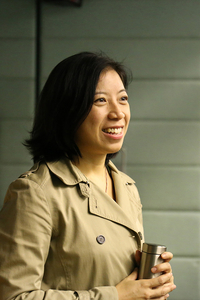


Associate Professor
Ph.D. (Anthropology), Columbia University
M. Phil. (Anthropology), Columbia University.
M. Phil. (Gender Studies/Government and Public Administration), CUHK
B. Soc.Sc. (Government and Public Administration), CUHK
KKB 224
3943-4274
Ka-ming Wu is Associate Professor, and Director of the Master Program in Intercultural Studies, in the Department of Cultural and Religious Studies at the Chinese University of Hong Kong. She was a visiting fellow, and now a life member, of Clare Hall, Cambridge University. Trained as a cultural anthropologist, she has taken up extensive ethnographic research to examine the cultural politics of state and society, waste, and most recently, gender and nationalism in contemporary China. Her academic papers have been published in high impact journals including Journal of Asian Studies, Modern China, Hau: Journal of Ethnographic Studies, The China Journal, Cities, Urban Geography, Ethnology, and China Perspectives.
Her recent teaching joins the field of environmental humanities, with course titles of “Living in the Anthropocene: Nature, Culture and Power” and “Introduction to Environmental Humanities: Debates in China.” Her research graduate seminar “Thing Theory” examines cutting-edge theories of new materialism, science and technology, objects and non-human to encourage students to conduct inter-disciplinary research beyond conventional humanities. Her book Feiping Shenghuo: Lajichang De Jingji, Shequn Yu Kongjian (CUHK 2016) (Living with Waste: Economies, Communities and Spaces of Waste Collectors in China) has a great impact on the public discussion of waste and has been covered by major media, such as the Guardian and Mingpao Hong Kong. Thinking waste a lot, she is starting a new research project on the ecological consequence of takeout phenomenon in China.
Ka-ming’s first ethnographic research took place in rural Yan’an, northwestern part of China in early 2000 where she developed her interest in the intersection of representations and practices of folk culture, socialist governance and urbanization. Her book monograph Reinventing Chinese Tradition: The Cultural Politics of Late Socialism (UIP 2015) argues the nature of cultural production in China today can thought in terms of a “hyper folk,’ in which ritual practices, performances, heritage, craft productions, and other reenactments of the traditional can no longer be viewed as either simulations or authentic originals, but a field where a whole range of social contests and changes are being negotiated.
Interested in social change in China, Ka-ming’s recent research looks at the production of gender, nationalism and citizen-making through discourse and practices of volunteering in major Chinese cities. Related research articles have appeared in Journal of Asian Studies and Feminist Studies.

An eye-opening study of an evolving culture and society within contemporary China
The final destination of the Long March and center of the Chinese Communist Party's red bases, Yan'an acquired mythical status during the Maoist era. Though the city's significance as an emblem of revolutionary heroism has faded, today's Chinese still glorify Yan'an as a sanctuary for ancient cultural traditions.
She has another new book The Life of Waste: Economy, Community and Space in a Beijing Scavengers’ site (Chinese University Press), which investigates a scavenger community and the cultural economy of waste in outskirt Beijing.

胡嘉明、張劼穎
Bordertown Thinker Series
The Chinese University Press
本書一系列田野考察呈現和講述在經濟迅速發展之下、北京城鄉廢品從業者的生活世界,並將垃圾視作參與社會政治關係的物質,審視它如何有機地參與在中國的轉型社會過程:階層斷裂、政策壁壘、城鄉經濟文化差異、農民工流動性和城鄉隔閡,糾纏在一起。
Books
Journal Articles and Book Chapters
Book Reviews
>> Check more on: http://cuhk.academia.edu/KamingWu/
Professor Wu Ka Ming | Research keywords for Cultural Studies: Waste Studies
http://ccs.crs.cuhk.edu.hk/main/research-keywords-wu-kaming/